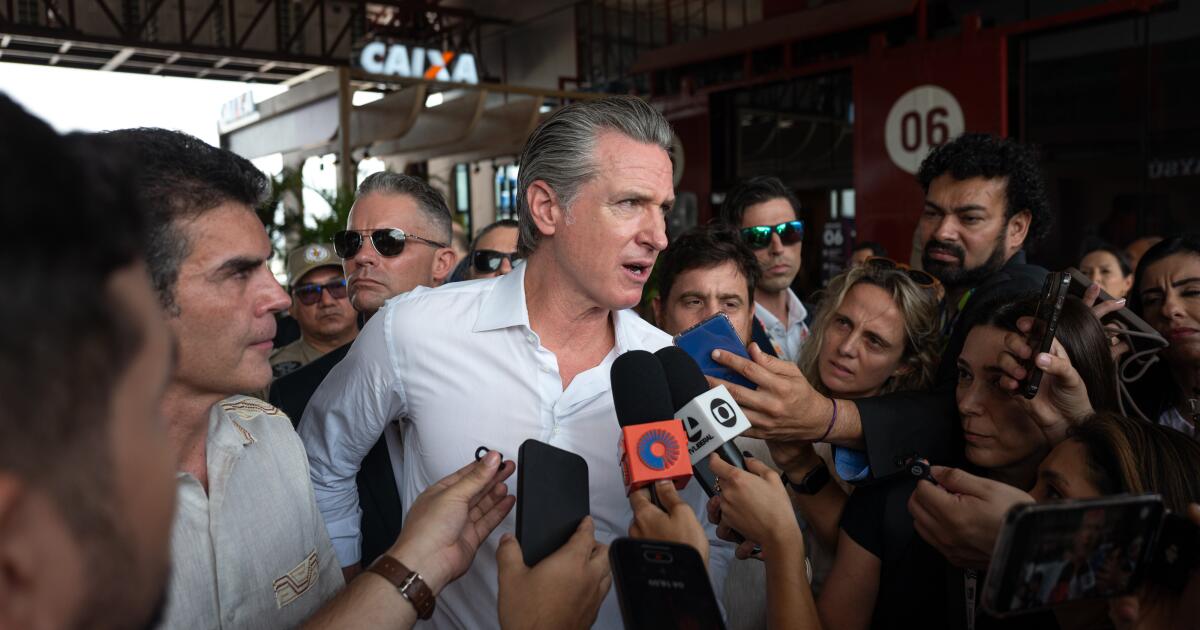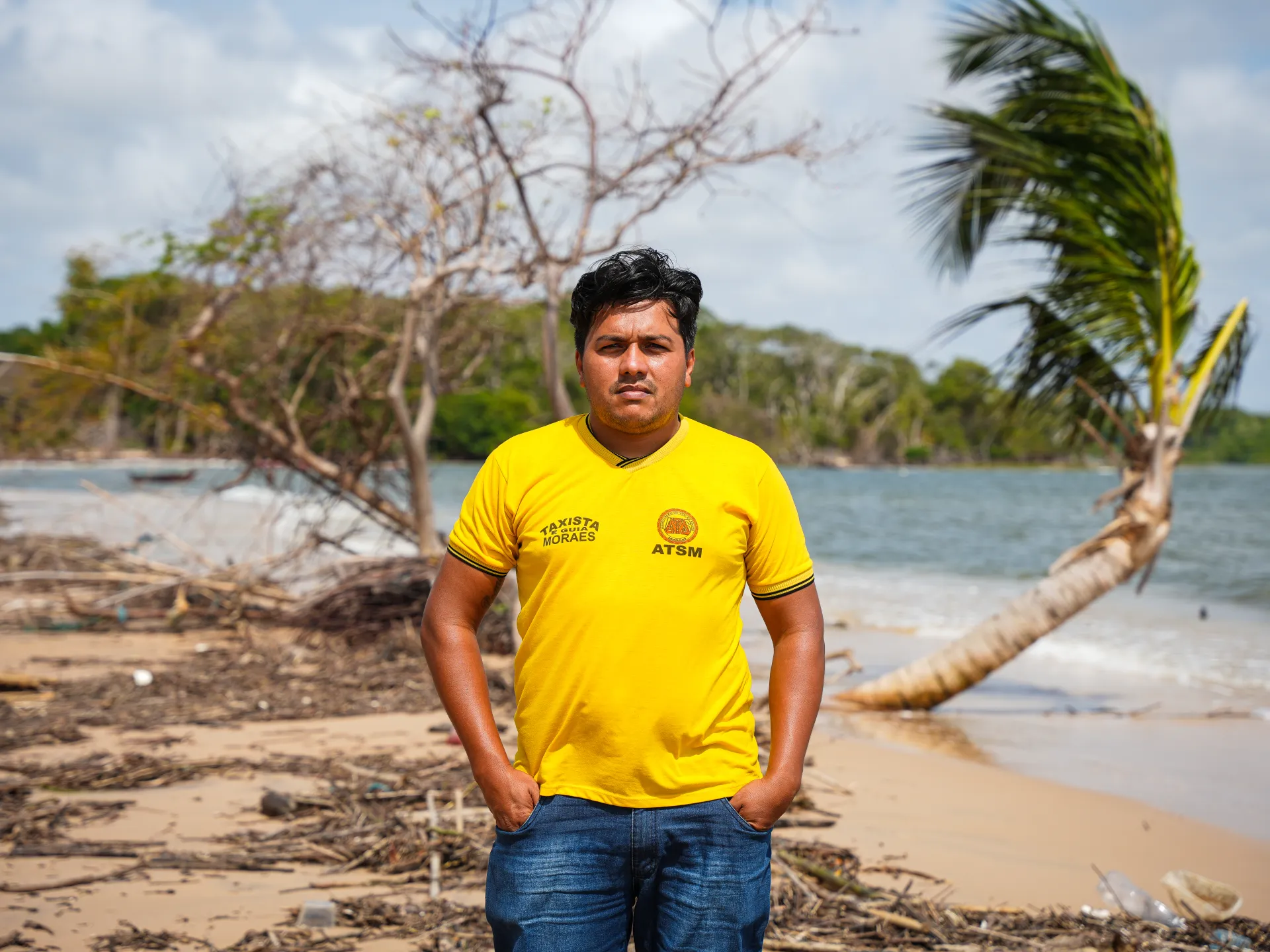At Brazilian climate summit, Newsom positions California as a stand-in for the U.S.
BELÉM, Brazil — The expansive halls of the Amazon’s newly built climate summit hub echoed with the hum of air conditioners and the footsteps of delegates from around the world — scientists, diplomats, Indigenous leaders and energy executives, all converging for two frenetic weeks of negotiations.
Then Gov. Gavin Newsom rounded the corner, flanked by staff and security. They moved in tandem through the corridors on Tuesday as media swarmed and cellphone cameras rose into the air.
“Hero!” one woman shouted. “Stay safe — we need you,” another attendee said. Others didn’t hide their confusion at who the man with slicked-back graying hair causing such a commotion was.
“I’m here because I don’t want the United States of America to be a footnote at this conference,” Newsom said when he reached a packed news conference on his first day at the United Nations climate policy summit known as COP30.
In less than a year, the United States has shifted from rallying nations on combating climate change to rejecting the science altogether under President Trump, whose brash governing style spawned in part from his reality-show roots.
Newsom has engineered his own evolution when coping with Trump — moving from sharp but reasoned criticism to name-calling and theatrical attacks on the president and his Republican allies. Newsom’s approach adds fire to America’s political spectacle — part governance, part made-for-TV drama. But on climate, it’s not all performance.
California’s carbon market and zero-emission mandates have given the state outsize influence at summits such as COP30, where its policies are seen as both durable and exportable. The state has invested billions in renewables, battery storage and electrifying buildings and vehicles and has cut greenhouse gas emissions by 21% since 2000 — even as its economy grew 81%.
“Absolutely,” he said when asked whether the state is in effect standing in for the United States at climate talks. “And I think the world sees us in that light, as a stable partner, a historic partner … in the absence of American leadership. And not just absence of leadership, the doubling down of stupid in terms of global leadership on clean energy.”
Newsom has honed a combative presence online — trading barbs with Trump and leaning into satire, especially on social media, tactics that mirror the president’s. Critics have argued that it’s contributing to a lowering of the bar when it comes to political discourse, but Newsom said he doesn’t see it that way.
“I’m trying to call that out,” Newsom said, adding that in a normal political climate, leaders should model civility and respect. “But right now, we have an invasive species — in the vernacular of climate — by the name of Donald Trump, and we got to call that out.”
At home, Newsom recently scored a political win with Proposition 50, the ballot measure he championed to counter Trump’s effort to redraw congressional maps in Republican-led states. On his way to Brazil, he celebrated the victory with a swing through Houston, where a rally featuring Texas Democrats looked more like a presidential campaign stop than a policy event — one of several moments in recent months that have invited speculation about a White House run that he insists he hasn’t launched.
Those questions followed him to Brazil. It was the first topic posed from a cluster of Brazilian journalists in Sao Paulo, Brazil’s largest city and financial hub, where Newsom had flown to speak Monday with climate investors in what he conceded sounded more like a campaign speech.
“I think it has to,” said Newson, his talking points scribbled on yellow index cards still in his pocket from an earlier meeting. “I think people have to understand what’s going on, because otherwise you’re wasting everyone’s time.”
In a low-lit luxury hotel adorned with Brazilian artwork and deep-seated chairs, Newsom showcased the well-practiced pivot of a politician avoiding questions about his future. His most direct answer about his presidential prospects came in a recent interview with “CBS News Sunday Morning,” on which Newsom was asked whether he would give serious thought after the 2026 midterm elections to a White House bid. Newsom responded: “Yeah, I’d be lying otherwise.”
He laughed when asked by The Times how often he has fielded questions about his plans in 2028 in recent days, and quickly deflected.
“It’s not about me,” he said before fishing a malaria pill out of his suit pocket and chasing it with borrowed coffee from a nearby carafe. “It’s about this moment and people’s anxiety and concern about this moment.”
Ann Carlson, a UCLA environmental law professor, said Newsom’s appearance in Brazil is symbolically important as the federal government targets Californa’s decades-old authority to enforce its own environmental standards.
“California has continued to signal that it will play a leadership role,” she said.
The Trump administration confirmed to The Times that no high-level federal representative will attend COP30.
“President Trump will not jeopardize our country’s economic and national security to pursue vague climate goals that are killing other countries,” White House spokesperson Taylor Rogers said.
For his own part, Trump told world leaders at the United Nations in September that climate change is a “hoax” and “the greatest con job ever perpetrated on the world.”
Since Trump returned to office for a second term, he’s canceled funding for major clean energy projects such as California’s hydrogen hub and moved to revoke the state’s long-held authority to set stricter vehicle emissions standards than those of the federal government. He’s also withdrawn from the Paris climate agreement, a seminal treaty signed a decade ago in which world leaders established the goal of limiting global warming to 2 degrees Celsius (3.6 degrees Fahrenheit) above preindustrial levels and preferably below 1.5 degrees Celsius (2.7 degrees Fahrenheit). That move is seen as pivotal in preventing the worst effects of climate change.
Leaders from Chile and Colombia called Trump a liar for rejecting climate science, while Brazilian President Luiz Inácio Lula da Silva broadly warned that extremist forces are fabricating fake news and “condemning future generations to life on a planet altered forever by global warming.”
Terry Tamminen, former California Environmental Protection Agency secretary under Gov. Arnold Schwarzenegger, contended that with the Trump administration’s absence, Newsom’s attendance at COP30 thrusts even more spotlight on the governor.
“If the governor of Delaware goes, it may not matter,” Tamminen said. “But if our governor goes, it does. It sends a message to the world that we’re still in this.”
The U.S. Climate Alliance, a bipartisan coalition of state leaders, said three governors from the United States attended COP30-related events in Brazil: Newsom, Wisconsin’s Tony Evers and New Mexico’s Michelle Lujan Grisham.
Despite the warm reception Newsom has received in Belém, environmentalists in California have recently questioned his commitment.
In September, Newsom signed a package of bills that extended the state’s signature cap-and-trade program through 2045. That program, rebranded as cap-and-invest, limits greenhouse gas emissions and raises billions of dollars for the state’s climate priorities. But, at the same time, he also gave final approval to a bill that will allow oil and gas companies to drill as many as 2,000 new wells per year through 2036 in Kern County. Environmentalists called that backsliding; Newsom called it realism, given the impending refinery closures in the state that threaten to drive up gas prices.
“It’s not an ideological exercise,” he said. “It’s a very pragmatic one.”
Leah Stokes, a UC Santa Barbara political scientist, called his record “pretty complex.”
“In many ways, he is one of the leaders,” she said. “But some of the decisions that he’s made, especially recently, don’t move us in as good a direction on climate.”
Newsom is expected to return to the climate summit Wednesday before traveling deeper into the Amazon, where he plans to visit reforestation projects. The governor said he wanted to see firsthand the region often referred to as “the lungs of the world.”
“It’s not just to admire the absorption of carbon from the rainforest,” Newsom said. “But to absorb a deeper spiritual connection to this issue that connects all of us. … I think that really matters in a world that can use a little more of that.”

